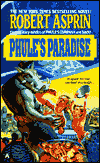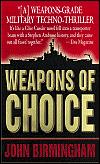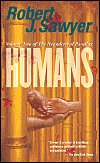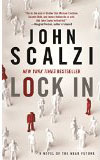
Star Trek: Destiny: Gods of Night, by David Mack
Book Review by David Roy
Have you read this book?
The Star Trek novel continuity among the various book series can be a bit daunting, especially when some of them take place at different times than others (the Deep Space Nine series is about three years behind the rest of the "after-movie" series). The editors are happy to keep it that way, letting all of the series move at their own pace. This can sometime affect any crossovers, however, case in point being David Mack's latest book, Destiny: Gods of Night. This isn't so much a crossover in the traditional sense, where each series has a book that contributes to the overall story. Instead, it is a trilogy that uses characters from all the various series and brings them together into one. Mack being the author he is, he knocks the ball out of the park yet again.
The Borg are back, but don't let that keep you away. It's a year after Nemesis and the Federation is at war again. This time, the Borg don't want to assimilate life. They want to annihilate the Federation and all that stand with it. The Enterprise is the main line of defense, but will Starfleet be able to stop a force of this nature when destruction is its overall goal? Meanwhile, in the Gamma Quadrant, newly promoted captain of the Aventine, Ezri Dax, has returned to the site of a find from a few years ago when she was Jadzia Dax, the wreckage of a starship from hundreds of years ago. How did it get all the way out here? And what secrets and dangers does it hold? The answers to these questions lie in the past, a past where a starship captain has to hold her crew together and keep their humanity intact in a struggle for survival.
Mack does a wonderful job of following all the various plot lines throughout Gods of Night (we also see the crew of the Titan, with Captain Riker and his wife Deanna Troi dealing with some personal tragedies of their own). He never stays with one long enough for it to get boring, instead jumping to another aspect of the story. Occasionally, we see a glimpse of somebody else who may play a part in the story in the future, such as Federation President Nan Bacco, but for the most part Mack stays with the three major ships and the storyline taking place in the past. I have not seen Mack write a bad book yet, and after reading this one, I still haven't.
He does a masterful job with the characterization as well, from the characters featured in the Enterprise television series to Picard's crew and all of the others as well. You can feel the pain of Troi and Riker as they face a personal crises. At times, it does go on a bit too long, but I found it fascinating more for what this all means for the command structure of the ship. First officer Christine Vale has always been one of my favourites, and she originally didn't want the job without reassurance that Riker and Troi's personal lives wouldn't end up affecting how the ship is run. Now they have come up to the first major instance of this happening, and it's fascinating to read about.
What's even more effective, though, is how the Borg don't really dominate the book even as they influence a large portion of it. This isn't a book of starship battles, though there are a couple near the beginning. Instead, it becomes a character issue for Picard as he must come to terms with this enemy that has assimilated him in the past and forever altered his outlook. The sense of foreboding during the Enterprise scenes as they move to intercept another Borg cube is portrayed remarkably well. It's one of the best portrayals of Picard I've seen in a while now.
Things do get tied together a bit too conveniently at the end of the book, but that's to be expected in a series-wide trilogy. Why have all of these plots if they're not going to converge at some point? Even better is how Mack leaves the ending, with a surprise revelation for one starship's crew and the Enterprise just getting ready to go into action with their possibly emotionally-crippled captain in command. I'm not a big fan of cliffhangers, but when the books are coming out only a month apart, I can forgive them. Mack leaves us a doozy, despite also giving some closure to a couple of the plot lines he has developed. The pacing is excellent.
Even if you don't follow any of the book series, Mack provides you with everything you need to understand what's going on. Obviously, some of the scenes pack more emotional punch if you know the history behind them, but it's not a necessity. This even applies to the various television series, though some knowledge of them would greatly help you figure out why you should care about some of these people.
Mack succeeds in making the reader beg for more at the end of Gods of Night. Let's hope he continues to deliver with the next novel in the trilogy.
The Borg are back, but don't let that keep you away. It's a year after Nemesis and the Federation is at war again. This time, the Borg don't want to assimilate life. They want to annihilate the Federation and all that stand with it. The Enterprise is the main line of defense, but will Starfleet be able to stop a force of this nature when destruction is its overall goal? Meanwhile, in the Gamma Quadrant, newly promoted captain of the Aventine, Ezri Dax, has returned to the site of a find from a few years ago when she was Jadzia Dax, the wreckage of a starship from hundreds of years ago. How did it get all the way out here? And what secrets and dangers does it hold? The answers to these questions lie in the past, a past where a starship captain has to hold her crew together and keep their humanity intact in a struggle for survival.
Mack does a wonderful job of following all the various plot lines throughout Gods of Night (we also see the crew of the Titan, with Captain Riker and his wife Deanna Troi dealing with some personal tragedies of their own). He never stays with one long enough for it to get boring, instead jumping to another aspect of the story. Occasionally, we see a glimpse of somebody else who may play a part in the story in the future, such as Federation President Nan Bacco, but for the most part Mack stays with the three major ships and the storyline taking place in the past. I have not seen Mack write a bad book yet, and after reading this one, I still haven't.
He does a masterful job with the characterization as well, from the characters featured in the Enterprise television series to Picard's crew and all of the others as well. You can feel the pain of Troi and Riker as they face a personal crises. At times, it does go on a bit too long, but I found it fascinating more for what this all means for the command structure of the ship. First officer Christine Vale has always been one of my favourites, and she originally didn't want the job without reassurance that Riker and Troi's personal lives wouldn't end up affecting how the ship is run. Now they have come up to the first major instance of this happening, and it's fascinating to read about.
What's even more effective, though, is how the Borg don't really dominate the book even as they influence a large portion of it. This isn't a book of starship battles, though there are a couple near the beginning. Instead, it becomes a character issue for Picard as he must come to terms with this enemy that has assimilated him in the past and forever altered his outlook. The sense of foreboding during the Enterprise scenes as they move to intercept another Borg cube is portrayed remarkably well. It's one of the best portrayals of Picard I've seen in a while now.
Things do get tied together a bit too conveniently at the end of the book, but that's to be expected in a series-wide trilogy. Why have all of these plots if they're not going to converge at some point? Even better is how Mack leaves the ending, with a surprise revelation for one starship's crew and the Enterprise just getting ready to go into action with their possibly emotionally-crippled captain in command. I'm not a big fan of cliffhangers, but when the books are coming out only a month apart, I can forgive them. Mack leaves us a doozy, despite also giving some closure to a couple of the plot lines he has developed. The pacing is excellent.
Even if you don't follow any of the book series, Mack provides you with everything you need to understand what's going on. Obviously, some of the scenes pack more emotional punch if you know the history behind them, but it's not a necessity. This even applies to the various television series, though some knowledge of them would greatly help you figure out why you should care about some of these people.
Mack succeeds in making the reader beg for more at the end of Gods of Night. Let's hope he continues to deliver with the next novel in the trilogy.
|
Click here to buy Star Trek: Destiny: Gods of Night, by David Mack on Amazon
|
Star Trek: Destiny: Gods of Night, by David Mack on Amazon

| More Books You Might Like |
Comment on Star Trek: Destiny: Gods of Night, by David Mack
| Comments on Star Trek: Destiny: Gods of Night, by David Mack |
| There are no comments on this book. |



